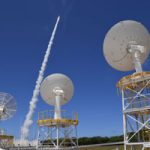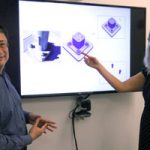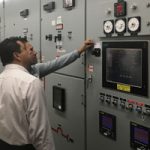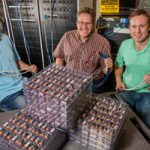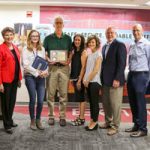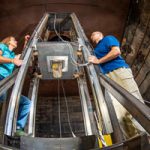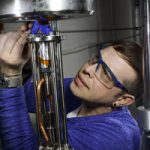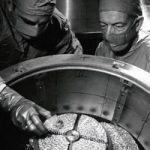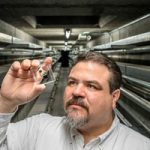HOT SHOT findings could save defense technology developers time and money
An early milestone for developing missile technologies is to show they can work in computer simulations or large-scale field tests that shake and spin components without falling to pieces. Now, HOT SHOT sounding rocket data analysis has revealed a way to improve these tests, providing an earlier, more accurate indicator of whether an experimental technology will ultimately succeed in flight.
Getting to the nuts and bolts of nuts and bolts
After more than five years, a mathematical breakthrough devised by a structural engineer and a computational scientist may save Sandia time and resources to test complex systems. The method is now being used in production in Sandia's Sierra code, and the designers say its potential is limited only by researchers' imagination.
Sandia helps Puerto Rico grid resilience
The Sandia-developed Microgrid Design Toolkit provides what-if analysis of microgrid design choices to provide quantitative insights to decision makers for hybrid energy solutions. Using the MDT tool, utilities and other community stakeholders can identify vulnerabilities in infrastructure particularly susceptible to natural disasters and related consequences.
Sandia Labs manufacturing spinoff steps into national market
Sandia’s Entrepreneurial Separation to Transfer Technology program helped Joe Beck and Eric Branson, both former employees, launch their small business. The Albuquerque-based Advanced Manufactured Power Solutions, or AMPS, is a custom manufacturing company builds battery packs, cables and other small components of larger machines.
Three Sandia teams win NA-50 Awards of Excellence
Jim McConnell, associate administrator for NNSA’s Office of Safety, Infrastructure and Operations, presented three Sandia project teams with NA-50 Awards of Excellence during a July ceremony at Sandia’s Albuquerque campus.
Sandia abuses batteries for better energy storage
Lithium-ion batteries are most commonly found in electric cars, computers, medical equipment and aircraft. And they are getting more powerful all the time. The constant push for more storage and power drives the need for extensive battery testing, and Sandia's new drop tower has created yet another way to learn more about how these batteries respond to stress.
Hydrogen materials service advanced by new multilab consortium
Researchers at Sandia and Pacific Northwest national laboratories are leading a collaborative effort to investigate how hydrogen affects materials such as plastics, rubber, steel and aluminum. The Hydrogen Materials Compatibility Consortium, or H-Mat, will focus on how hydrogen affects polymers and metals used in diverse sectors, including fuel cell transportation and hydrogen infrastructure.
Man on the moon
On July 20, 1969, nearly 650 million people watched as Neil Armstrong took “...one small step for a man, one giant leap for mankind,” when the Apollo 11 mission landed the first man on the moon. This year marks the 50th anniversary of that mission, and Sandia was part of the team.
Portable gas detection shrinks to new dimensions
A sensor for detecting toxic gases is now smaller, faster and more reliable, thanks to researchers at Sandia. The sensor’s performance sets it up for integration into a highly sensitive, portable system for detecting chemical weapons. The sensors can also rapidly detect airborne toxins.
Sandia author examines carbon storage in deep saline formations
A new book co-authored and co-edited by Sandia experimental geochemist Anastasia Ilgen provides a comprehensive look at carbon storage in deep saline formations. The volume, published by Elsevier, is entitled Science of carbon storage in deep saline formations: Process coupling across time and spatial scales.
